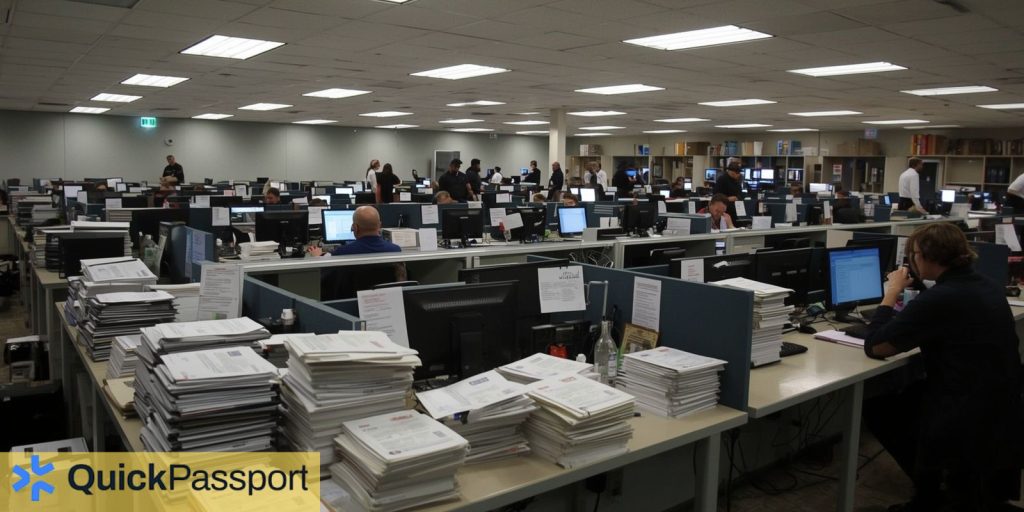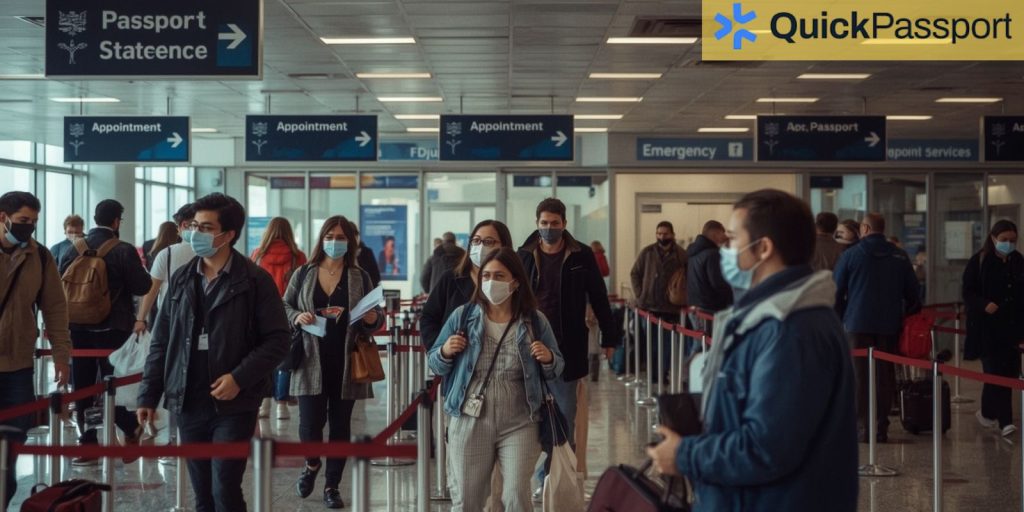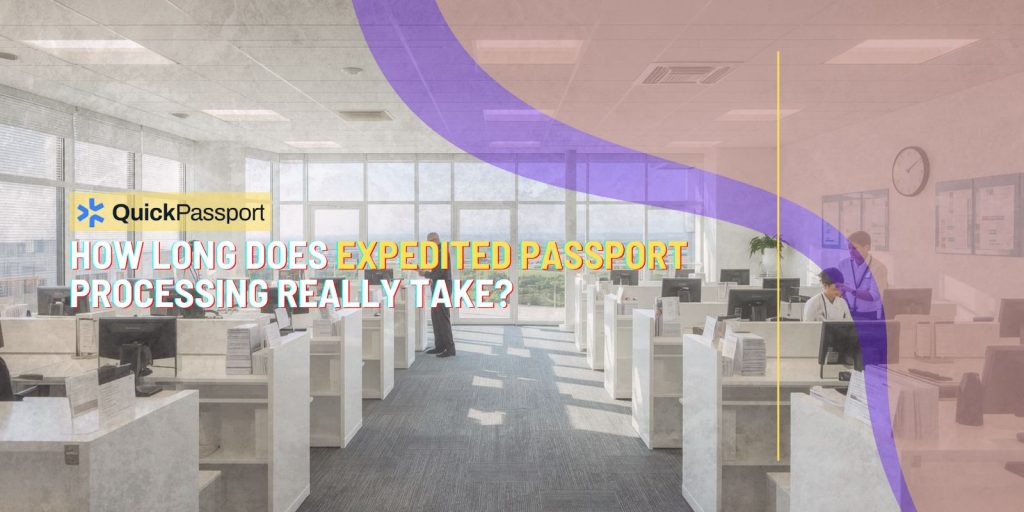When you need a passport quickly, understanding how long expedited passport processing really takes can make the difference between making your travel plans and missing that important trip. The official government timeline of 2-3 weeks for expedited service often leaves travelers wondering if they can truly rely on these estimates, especially during peak travel seasons or unexpected delays.
Expedited passport processing has become increasingly crucial as international travel rebounds and people find themselves needing travel documents on shorter notice than ever before. Whether you’re facing a family emergency abroad, a last-minute business opportunity, or simply discovered your passport expired just weeks before your planned vacation, knowing the realistic timeframes for expedited processing can help you make informed decisions about your travel documentation needs.
The complexity of expedited passport processing extends beyond simple government timelines. Multiple factors influence how long your expedited passport application will actually take, from the time of year you apply to the completeness of your documentation, the processing center handling your application, and even current staffing levels at passport agencies. Understanding these variables helps set realistic expectations and allows you to plan accordingly.
Many travelers assume that paying the expedited fee guarantees their passport will arrive within the promised timeframe, but the reality involves more nuance. Processing times can vary significantly based on external factors, and what constitutes “expedited” service has evolved over the years as demand for passport services has fluctuated. Additionally, the difference between routine and expedited processing involves more than just speed – it often requires different application strategies and documentation approaches.
This comprehensive guide examines the real-world timelines for expedited passport processing, helping you understand not just the official estimates but the practical considerations that affect actual processing times. We’ll explore various expediting options, from standard expedited service to emergency same-day processing, and provide insights into when each option makes sense for your specific travel timeline and circumstances.
Key Takeaways
- Standard expedited processing typically takes 2-3 weeks from the time your application is received, though this can extend during peak travel seasons or when processing centers experience high volume.
- Emergency passport services can provide same-day processing for travelers with documented proof of international travel within 14 days, but require appointments at regional passport agencies.
- Peak travel seasons significantly impact processing times, with spring and summer months often experiencing delays that can push expedited processing closer to 4-5 weeks.
- Application completeness directly affects processing speed, as incomplete applications or missing documentation can add weeks to your processing time regardless of expedited fees paid.
- Private expediting services can reduce processing time to 1-2 weeks by hand-carrying applications and maintaining direct relationships with processing centers.
- Renewal applications generally process faster than first-time applications, even within expedited services, due to simpler verification requirements and existing records.
- Regional processing centers have varying workloads, meaning identical applications submitted on the same day may have different processing times depending on which center handles them.
- Additional fees for expedited shipping are separate from processing fees, and choosing overnight delivery for both submission and return can save 3-5 business days total.
Understanding Expedited Passport Processing Timelines
The official expedited passport processing time of 2-3 weeks represents the government’s target timeline under normal operating conditions, but understanding what “normal” means in practical terms helps set appropriate expectations. This timeframe begins counting from when your application is received and logged into the system at a passport processing center, not from when you mail your application or visit an acceptance facility.

Processing times fluctuate based on seasonal demand patterns that have become increasingly predictable over the years. Spring months typically see increased volume as travelers prepare for summer vacations, while late fall and winter generally offer the fastest processing times. However, unexpected events like natural disasters, staffing shortages, or changes in travel restrictions can disrupt these patterns and extend processing times significantly.
The expedited processing fee, currently $60 in addition to standard application fees, prioritizes your application within the processing queue but doesn’t guarantee processing will occur faster than the stated timeframe. During periods of extremely high volume, even expedited applications may approach or exceed the 2-3 week estimate, particularly if your application requires additional review or documentation.
Different types of passport applications also process at different speeds within the expedited category. Renewal applications for adults typically move through the system faster than first-time applications, which require more extensive verification. Child passport applications often take longer due to additional documentation requirements and verification procedures, even when expedited processing is requested.
Factors That Affect Expedited Processing Speed
Multiple variables influence how quickly your expedited passport application moves through the system, with some factors within your control and others dependent on external circumstances. Understanding these factors helps you optimize your application strategy and set realistic expectations for when your passport will arrive.
Application completeness stands as the most controllable factor affecting processing speed. Missing signatures, incorrect fees, poor-quality photos, or incomplete forms can delay processing by weeks, regardless of expedited fees paid. Even minor errors like using the wrong type of pen or failing to include middle names exactly as they appear on supporting documents can trigger additional review processes that significantly extend processing time.
The processing center that receives your application plays a crucial role in determining actual processing speed. Some centers consistently process applications faster than others due to staffing levels, efficiency measures, or regional workload distribution. Applications submitted in certain geographic areas may be routed to centers with shorter queues, while others may go to facilities experiencing higher volume or staffing challenges.
Seasonal and external factors create significant variability in processing times. Peak travel seasons, federal holidays, and unexpected events like system upgrades or policy changes can all impact processing speed. Additionally, increased security measures or changes in international relations can trigger enhanced review procedures that extend processing times for certain applications.
Your personal circumstances and travel history may also influence processing speed. First-time applicants, those with complex travel histories, or individuals requiring additional identity verification may experience longer processing times. Similarly, applications that trigger security reviews or require consultation with other agencies will take longer than straightforward renewals, even within expedited processing.
Emergency and Same-Day Passport Options
For travelers facing truly urgent situations, emergency passport services provide options beyond standard expedited processing, though these services come with strict eligibility requirements and additional complexity. Same-day passport processing is available through regional passport agencies for travelers who can document international travel within 14 days or who need a passport for urgent humanitarian reasons.
Regional passport agencies, located in major metropolitan areas, offer the fastest passport processing available through government services. These facilities can issue passports the same day for qualifying emergencies, though appointments are required and often difficult to secure during busy periods. Travelers must provide proof of immediate travel needs, such as airline tickets or documentation of family emergencies abroad.
The appointment system for emergency services operates on a first-come, first-served basis, with appointments typically becoming available 14 days in advance. During peak travel seasons, appointments may be fully booked, requiring travelers to call repeatedly or check online systems frequently for cancellations. Some agencies also accept walk-in applicants for true emergencies, though wait times can be extensive and service isn’t guaranteed.
Private expediting services offer an alternative for urgent passport needs, often providing faster service than standard expedited processing without requiring proof of emergency travel. These services typically charge additional fees ranging from $100 to $500 depending on processing speed, but can often deliver passports within 1-2 weeks by hand-carrying applications to processing centers and maintaining direct relationships with passport officials.
Emergency passport processing requires complete documentation and perfect application preparation, as there’s no time to correct errors or request additional documents. Travelers using emergency services should prepare backup travel plans, as even same-day processing can face unexpected delays due to system issues, staffing problems, or application complications that arise during processing.
Cost Considerations for Expedited Processing
The financial investment in expedited passport processing extends beyond the basic expedited fee, with multiple cost components that can significantly impact your total expense depending on your timeline and processing choices. Understanding the complete cost structure helps you make informed decisions about which expediting options provide the best value for your specific situation.

Standard government expedited processing requires a $60 fee in addition to regular passport fees, which range from $130 for adult renewals to $165 for first-time adult applications, plus $35 execution fees for new applications. However, expedited processing fees don’t include expedited shipping, which requires an additional $21.36 for overnight delivery of your completed passport. Many applicants also choose expedited shipping for their application submission, adding another $25-30 in shipping costs.
Private expediting services charge premium fees that vary based on processing speed and service level. Basic expediting services that promise 2-week delivery typically charge $100-200 above government fees, while same-day or next-day services can cost $300-500 in expediting fees alone. These services often include expedited shipping and handling, but travelers should verify exactly what’s included in quoted prices to avoid unexpected additional charges.
Emergency processing at regional passport agencies involves the same government fees as standard expedited processing, but additional costs often arise from travel requirements. Many travelers must book last-minute flights or hotel accommodations to reach regional agencies, potentially spending hundreds of dollars in travel costs to save time on passport processing. Additionally, taking time off work for agency visits can represent significant opportunity costs for many applicants.
When evaluating expediting costs, consider the total financial impact of delayed travel plans versus expediting fees. Rebooking flights, changing hotel reservations, or missing business opportunities due to passport delays can often cost more than even premium expediting services. However, for routine travel planning, standard expedited processing usually provides the best balance of speed and cost-effectiveness.
Working with Professional Passport Services
Professional passport expediting services like QuickPassport – Phoenix offer specialized expertise and established relationships that can significantly streamline the expedited passport process, particularly for travelers facing tight deadlines or complex application requirements. These services provide value beyond simple application submission, offering consultation, error prevention, and direct advocacy throughout the processing period.
Experienced passport services understand the nuances of different processing centers and can often route applications to facilities with shorter processing times or better track records for meeting expedited timelines. This knowledge proves particularly valuable during peak seasons when some processing centers become overwhelmed while others maintain normal processing speeds. Professional services also stay current on policy changes, seasonal patterns, and processing center updates that can affect application timing.
Error prevention represents one of the most significant values professional services provide, as application mistakes can add weeks to processing time regardless of expedited fees paid. Professional services review applications for completeness, accuracy, and compliance with current requirements before submission, dramatically reducing the likelihood of processing delays due to application errors. This review process often identifies potential issues that applicants might overlook, such as photo quality problems or documentation inconsistencies.
QuickPassport – Phoenix and similar professional services also provide application tracking and status updates throughout the processing period, giving travelers better visibility into their application progress than standard government tracking systems provide. This communication helps travelers plan travel arrangements with greater confidence and provides early warning if processing delays develop that might affect travel plans.
The consultation services provided by professional passport expeditors prove particularly valuable for complex situations, such as name changes, lost passports while traveling, or applications requiring additional documentation. These specialists can recommend the most efficient processing strategies, identify potential complications before they cause delays, and provide guidance on backup options if standard expedited processing won’t meet travel deadlines.
Frequently Asked Questions
How long does expedited passport processing actually take during peak season?
During peak travel seasons (typically March through August), expedited passport processing often takes 3-4 weeks instead of the standard 2-3 week estimate. High volume at processing centers can extend timelines, making it essential to apply at least 6 weeks before travel during busy periods.
Can I track my expedited passport application status?
Yes, you can track your application status online using your last name, date of birth, and either your Social Security number or application locator number. However, status updates may lag behind actual processing progress by several days.
What happens if my expedited passport doesn’t arrive in time for travel?
If your expedited passport doesn’t arrive within the promised timeframe and you have travel within 14 days, you may be eligible for emergency processing at a regional passport agency. Contact the National Passport Information Center for guidance on emergency options.
Is expedited processing available for all types of passport applications?
Expedited processing is available for most passport applications, including renewals, first-time applications, and child passports. However, some applications requiring extensive additional documentation or security reviews may not benefit significantly from expedited processing.
How much does expedited passport processing cost in total?
Total costs include the $60 expedited processing fee, standard passport fees ($130-165 depending on application type), potential $35 execution fee for new applications, and $21.36 for expedited return shipping. Total costs typically range from $200-250 for most expedited applications.
Can I upgrade to expedited processing after submitting my application?
In some cases, you may be able to upgrade to expedited processing by calling the National Passport Information Center, though this isn’t guaranteed and may require additional processing time to implement the change.
What’s the difference between expedited processing and emergency processing?
Expedited processing takes 2-3 weeks and is available for any traveler willing to pay the additional fee. Emergency processing provides same-day service but requires proof of travel within 14 days and appointments at regional passport agencies.
Do private expediting services really work faster than government expedited processing?
Private expediting services often deliver passports faster than standard government expedited processing by hand-carrying applications, maintaining direct relationships with processing centers, and ensuring error-free applications. Processing times of 1-2 weeks are common with reputable private services.
Conclusion
Understanding how long expedited passport processing really takes requires looking beyond official government estimates to consider the practical factors that influence actual processing times. While the standard 2-3 week timeline provides a useful baseline, real-world processing times vary significantly based on seasonal demand, application completeness, processing center workloads, and external factors that can impact government operations.
Successful expedited passport processing depends largely on proper preparation and realistic timeline planning. Travelers who submit complete, error-free applications during off-peak periods typically receive their passports within the promised timeframe, while those applying during busy seasons or with incomplete documentation may experience significant delays. Understanding these variables allows you to plan appropriately and choose the expediting option that best matches your travel timeline and budget.
For travelers facing tight deadlines, professional expediting services like QuickPassport – Phoenix offer valuable expertise and established relationships that can significantly improve processing speed and reliability. While these services involve additional costs, they often provide better outcomes than attempting to navigate the expedited processing system independently, particularly for complex applications or urgent travel needs.
The key to successful expedited passport processing lies in understanding your options, preparing thoroughly, and building appropriate buffers into your travel planning. Whether you choose standard expedited processing, emergency services, or professional expediting assistance, early action and careful preparation remain the most reliable strategies for ensuring your passport arrives when you need it for your international travel plans.






